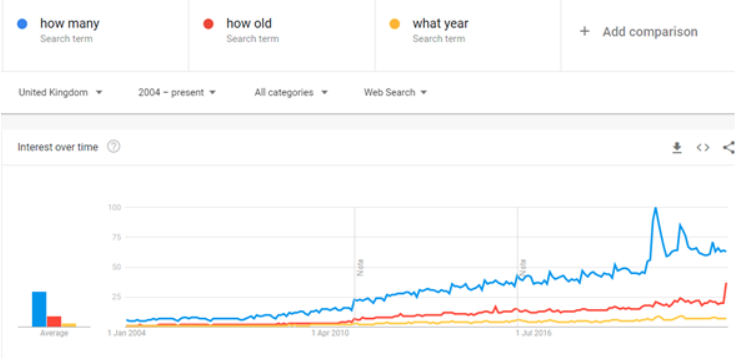What is Digital Amnesia?
Digital Amnesia was first mentioned in 2011, identified as our inability to remember day to day information or general knowledge as we increasingly relied on our digital devices for help. The article also noted that information we gained online was not as easy to remember as if we had been told face to face or read it in a book.
Colloquially it became known as the ‘Google effect’ after the search engine of choice for this information recall. (source) A quick review of Google Trends shows how the question has come to dominate search:

You only have to watch the Google ‘Year in Search’ video for 2021 <here> to see how we turn to Google – and other search engines – to gather information that we previously turned to friends, family, books or specialists for, prior to the Digital Age. *This video may cause an emotional reaction*
Coincidentally (or not, depending on your views on digital conspiracy) 2011 was also the year that Siri was launched on Apple devices, prompting users to slowly forget their mum’s phone number (guilty). A plethora of digital assistants now live around our homes and workplaces, ever at our fingertips.
What’s Happened since 2011
A study, released in March 2022 by the University of Cologne and conducted by Dr. Esther Kang and team, established that, with easy access to knowledge, users are more likely to retain different types of information in order to successfully search and find answers in future.
In essence, it is not that Digital Amnesia has doomed human intelligence, but we have shifted our information retention and instead remember how we can gain that knowledge again at a later time, rather than recall the information itself.
In the Study, Dr Kang showed participants an advert for a credit card offer and then followed how they would recall that advert & details within. Almost all participants turned to search for the details of the offer online. They also didn’t use brand terms, indeed the memory recall of the actual offer was low but the retention of the search term they used was high. To retain the information, most participants went on to subscribe to the newsletter, so that they had the offer and next steps readily available for future reference.
What does this mean for Digital Advertising
For us search marketers, it firmly establishes what we have known for a long time: search tends to be the final touch-point in a user’s journey. But how can we get them to you, our client, quicker?
A joined-up process between advertising and search has long been the dream scenario. Ideally the collaborative work should help own the search term in any offline or upper funnel-based activity & content. The second screen search moments have been the go-to of us all since digital devices became handheld.
Search is often treated as a siloed activity concentrating on core terms or past performance, with some reference to other activity in the form of ad copy. It would be easy to rely on Brand uplift only in search during TV advertising, product placement or Influencer activity however as the study establishes it is likely the brand recall will be low; you need to be present for all the relevant content in your advertising through search. Here it would be to your advantage to use your search insights to keep ahead of trending terms, which is especially hard in the age of automation.
A little side note that the study also points to, if you want to keep in touch with customers – make it seamless for them to do so. For example, ensure your sale process is super-efficient, a sign up for a newsletter is easy; don’t rely on them coming back to you especially if digital amnesia strikes, capture them there & then.
At PHA we know this to be the case and that is why our digital and PR teams work together to get the best outcome for you as our client. If you want to know more, please give us a bell. Or search for us online using the skills Digital Amnesia have taught us all.
If you’d be interested in discussing how a Digital PR strategy could benefit your business get in touch with our team today.